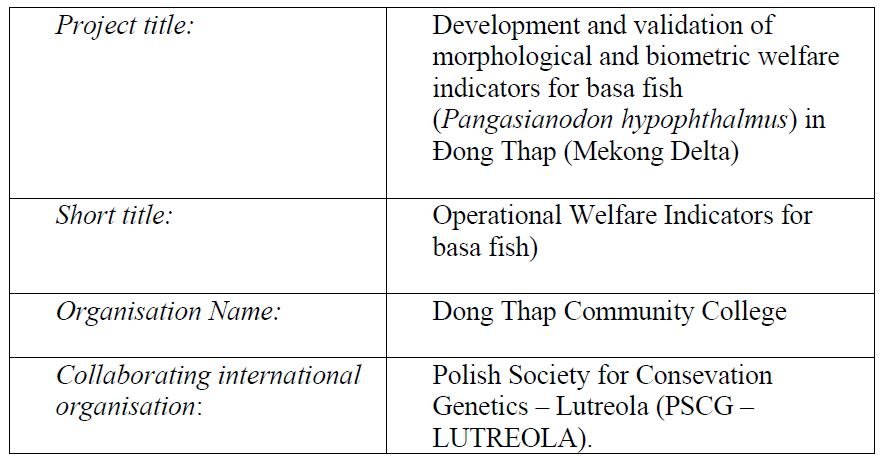The team at Dong Thap Community College share news of their project on determining operational welfare indicators for basa fish.
The basa fish studied in the project implemented in Dong Thap province are cultured in ponds in a variety of extensive to intensive culture systems. So far, the project has surveyed and collected samples of 31 fish farms in Dong Thap province. Basa farms are concentrated in localities such as Cao Lanh district, Tan Hong district, Hong Ngu city, Tam Nong district, and Lap Vo district. Members participating in the survey and sampling activities are lecturers and students of aquaculture of Dong Thap Community College.
Intensive pond culture of basa
The research team participate in feeding the fish at the pond
The research team visiting a pond farm site
The main activity of the project is to photograph the external characteristics of the Basa:
Overall appearance
Mouth
Eyes
Fins: caudal fin, dorsal fin, ventral fin
Gills
Overall appearance of basa
Additional information was collected through interviews with pond managers as well as through direct observation by research team members of activities at fish farms.
Measuring the length of a basa
Research indicators directly surveyed included: Fish total weight (g), Fish total length (cm), Viscera weight (g), Liver weight (g), Gonads weight (g), Fulton's Condition Factor (K), Viscerosomatic Index (VSI), Hepatosomatic Index (HIS), and Gonadosomatic Index (GSI).
Sampling at a basa pond
The aquaculture students participating in some of the project's activities are well trained before going to the farms to work with lecturers and experts. That creates opportunities for students to study and improve their professional qualifications and become advocates for fish welfare in Dong Thap and the Mekong Delta provinces in the future.



The research team's sample collection activities are recorded, the information is encrypted and stored carefully. Discussions and exchange of information between team members are carried out regularly throughout the research process to ensure the scientific reliability of the project.




Due to the relatively new content of the research project with farmers who culture basa in Dong Thap province, they do not have much information about fish welfare. However, the research team has made a lot of effort in combining information collection and sample collection with advocacy about the importance and benefits of applying fish welfare in Dong Thap province as well as other provinces of the Mekong Delta. Basa fish farmers in Dong Thap province have gradually become more receptive to fish welfare activities, especially applied to basa. Many farm owners enthusiastically exchanged information related to the research content to help the research team carry out their work more conveniently.







